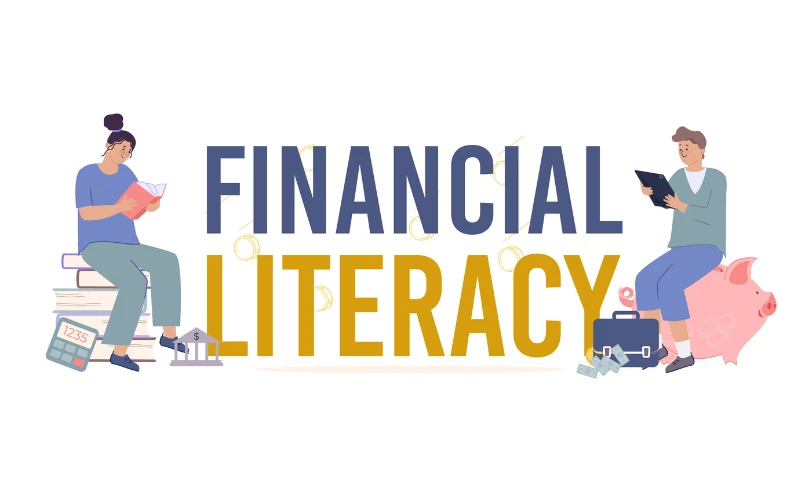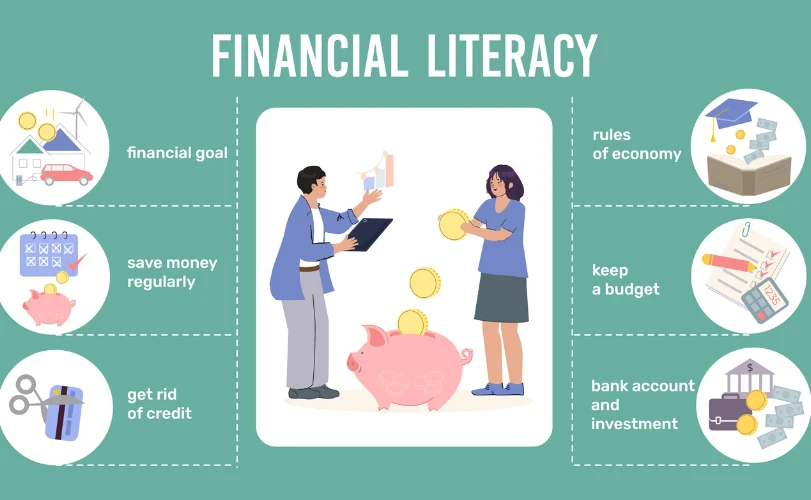Money touches every part of human life. It shapes daily choices dreams future plans personal security study goals family peace and long term comfort. Many people do not get a chance to learn how money works in simple words. This is why a clear guide on financial literacy helps many young people adults parents workers new earners business owners students and anyone who handles money in daily life.
Financial literacy meaning grows from small steps. These steps show how money comes in how money goes out how money grows slowly with time and how money must stay safe. When a person learns these steps with a calm mind that person slowly builds a strong money habit that supports a long life. This one habit lifts a person during hard times helps in low income phases supports during sudden bills and makes future dreams feel possible.
This full guide slowly explains what is financial literacy what does financial literacy mean importance of financial literacy benefits of financial literacy what is financial literacy for students and many more simple ideas. You will find soft child level English so every line stays easy for Indian readers who need clear flowing language.
Financial Literacy Meaning
Financial literacy meaning is the simple skill of using money in a wise way. It teaches a person how to earn money how to save money how to spend money in a careful way how to borrow money with care how to invest money for slow future growth and how to protect money from loss.
It does not need big words or heavy ideas. It grows through small daily actions like making a small plan for monthly money checking prices before buying keeping money habits clear and spending with a calm mind. When a person learns these actions early that person feels more safe with money choices in daily life.
Financial literacy meaning also includes understanding small money tools like bank accounts digital wallets small investment products simple insurance plans debt rules and safe online money habits. These tools change with time so a person must keep small learning steps open throughout life.
What Is Financial Literacy
What is financial literacy is a common question people ask when they begin their money journey. It means a gentle mix of money knowledge and money practice. It teaches a person to think before spending to save before trouble comes to stay patient with long term goals to avoid unsafe loans to ask questions when money feels confusing and to plan money flow in a slow clear way.
Financial literacy begins with simple ideas like
knowing monthly income
noting every expense
learning difference between need and want
planning money for short goals
planning money for long goals
understanding interest charges
knowing how to avoid extra debt
saving something each month even if the amount is small
Once these ideas settle inside daily life a person slowly understands more advanced money steps like investing for future comfort planning for a house planning for child study planning for health needs choosing safe insurance plans and building a simple retirement path.

What Does Financial Literacy Mean in Daily Life
What does financial literacy mean in real life It means you learn how money works around you every single day. You understand spending choices you see risk in high interest loans you avoid unsafe schemes you keep money for emergencies you track goals you clear past mistakes and you stay open to new lessons.
Financial literacy meaning changes with age. A school child needs very small lessons like saving pocket money. A young student needs lessons on how to manage study costs. A new worker needs lessons on salary handling and first bank accounts. A family person needs lessons on bills school fees home repair costs and emergency support. An older person needs lessons on medical funds retirement plans and safe storage.
So financial literacy meaning stays wide simple and practical. It grows with every stage of life.
Importance of Financial Literacy
Importance of financial literacy is deep because money affects health joy family peace and future dreams. Without simple money knowledge many people fall into high loans unsafe investments wrong spending and stress during hard times.
Here are simple reasons behind importance of financial literacy
It guides a person to make smart money choices
It reduces money mistakes
It supports long term comfort
It protects a person from unsafe money traps
It helps during sudden bills expenses or job loss
It gives clear direction for goals
It improves savings rate
It builds healthy spending habits
It supports early retirement plans
It reduces fear around complex money topics
When a person understands importance of financial literacy that person slowly becomes more confident with planning. Money stops feeling scary and becomes a tool for a good calm life.
Read – आय पर लगने वाले टैक्स का रिटर्न भरना
Benefits of Financial Literacy
Benefits of financial literacy spread through whole life. They touch mind family daily living and long future plans. Here are simple benefits of financial literacy written in very clear English
Better control over spending
More savings even with low income
Less debt because you borrow with caution
More peace because money stays organized
Less shock during sudden expenses
More clarity for big life steps
Safer use of credit cards
Smart investment habits for slow growth
Simple planning for child study
Clear path for home purchase
Easy support for retirement years
Benefits of financial literacy also show in day to day choices. A person learns to wait before buying. A person sees wasteful spending early and stops it. A person starts saving small coins small notes and small monthly amounts without pressure. These tiny actions create big change over time.

What Is Financial Literacy for Students
What is financial literacy for students is a very important topic. Students stand at a point where life choices begin. They learn study habits new ideas skills and social lessons. Money habits also begin at this point. When students learn simple money rules early they stay safe through adult life.
Financial literacy for students teaches how to handle pocket money how to avoid impulse buying how to save slowly how to avoid unsafe online spending how to choose study loans with care how to plan study costs how to manage living costs in hostel how to plan for first job and how to slowly grow money habits.
Students who learn these lessons early do not fall into heavy debt later. They understand how to keep credit score safe. They avoid traps like quick loans unsafe EMI offers wrong card usage and fake investment plans.
So what is financial literacy for students It is a source of life long support that guides them at every stage.
Building Personal Financial Management Skills
Personal financial management is the heart of financial literacy. It teaches how to watch monthly income how to plan every bill how to keep track of expenses and how to manage cash flow with calm clear rules.
A person begins with a small budget. This budget lists income fixed bills study fees rent food travel small needs and simple savings. When this list stays clear a person understands how money moves every month.
Budget rules must stay soft and easy. Avoid pressure. Start slow. Note one month. Watch where money goes. Adjust next month. Keep this habit alive. Soon money feels under control.
Personal financial management also teaches you to keep money aside before spending. This small trick helps build strong savings over time.
Saving and Investing for Long Term Growth
Saving and investing are two simple parts of financial literacy. Saving keeps money safe for short needs. Investing grows money slowly for long goals.
Saving can start with very small amounts. Even small coins add up over time. Keep saving simple. Use a bank account. Use digital savings tools if they feel safe. Save before spending. Do not wait until month ends.
Investing begins once savings habit feels steady. Investing builds slow growth through products like mutual funds simple stock plans pension tools gold saving options and long term digital funds. These grow slowly so a person must stay patient for many years.
Financial literacy teaches how to choose safe options how to avoid risky schemes how to watch interest rates how to plan long goals and how to trust slow growth.
Read Difference Between Cost Accounting and Financial Accounting
Debt Management Skills
Debt can help or hurt based on how it is used. Financial literacy meaning teaches a person how to borrow with care. A good loan has clear purpose low interest and comfortable repayment. A unsafe loan grows fast and creates stress.
Debt management teaches how to check interest charges how to compare loan plans how to avoid unnecessary borrowing how to pay high interest loans first how to avoid missed payments and how to check credit score often.
A person with good debt habits stays safe from heavy bills. This builds long term peace.
Risk Management and Money Protection
Risk management means keeping money safe from sudden loss. It includes learning how to pick simple insurance plans for health life home and travel. It also includes learning how to avoid fraud how to watch online activity how to avoid unsafe apps and how to protect passwords.
Financial literacy for students and adults teaches safe online habits. Digital spending is common now so safe steps are important. Use trusted platforms. Avoid quick profit promises. Do not share card numbers. Keep OTP safe.
Financial Planning for Life Goals
Financial planning joins all money skills together. It helps a person dream clearly and take steps toward those dreams. Goals can be small like buying a phone or paying travel costs. Goals can also be big like buying a house funding child study or planning retirement.
Financial planning teaches how to break a big goal into small monthly steps. It teaches time planning money allocation savings discipline and patient thinking. When these steps join together dreams become possible.
Easy Resources to Improve Financial Literacy
A person can learn financial literacy through many free tools. Some tools include
- online study pages
- simple books
- digital videos
- beginner investment guides
- student tools
- bank learning pages
- budgeting apps
Use any tool that feels simple and friendly. Learn slow. Practice daily.
How to Build Strong Financial Literacy Habits
Here are gentle steps to grow financial literacy
- create a small budget
- track every expense
- save something each month
- pay bills on time
- avoid extra loans
- check credit score
- invest small amounts
- learn new skills often
Small habits build big results.
Read – गेहूं का भाव बढ़ेगा या नहीं?
Final Thoughts on Financial Literacy
Financial literacy meaning is simple. It is a life skill that helps every person stay safe comfortable and clear with money. It teaches how to plan how to save how to spend how to borrow with care how to invest slowly and how to protect wealth.
When a person understands what is financial literacy when a person learns importance of financial literacy when a person enjoys benefits of financial literacy and when a student learns what is financial literacy for students that person builds a strong foundation for life.
Money becomes a friend instead of a fear. Goals feel possible. Family stays safe. Future grows with clear steps. This is why financial literacy stays important for every person across every stage of life.
If you want I can also prepare meta title meta description social captions or a shorter version for school or college use.
FAQs
FAQ 1: What is financial literacy in simple words
Financial literacy means learning how money works in daily life. It teaches how to earn spend save borrow and invest in a safe and smart way.
FAQ 2: Why is financial literacy important for students
Financial literacy helps students avoid unsafe loans control pocket money plan study costs save for future goals and build healthy habits before adult life begins.
FAQ 3: How can a person improve financial literacy
A person can improve financial literacy by making a small budget tracking expenses saving a little every month learning safe loan rules reading simple money guides and practicing these steps often.
FAQ 4: What are common benefits of financial literacy
Common benefits include better spending control more savings less debt safe investment choices smart long term planning and more peace during emergencies.
FAQ 5: How does financial literacy help during tough times
Financial literacy helps during tough times by keeping emergency savings ready reducing high loans guiding smart spending and giving clear steps to handle sudden bills or income loss.

Chirag Vaishnav is a finance enthusiast with deep knowledge of the stock market, investment strategies, and financial planning. He has spent years studying market trends, company fundamentals, and global economic movements. Coming from a background rooted in business and finance, Chirag is passionate about helping people make smarter investment decisions and achieve financial freedom. Through his insightful blogs, he simplifies complex financial concepts and shares practical tips for beginners and experienced investors alike. Many readers trust his analysis and guidance to navigate the ever-changing world of stocks and investments.



